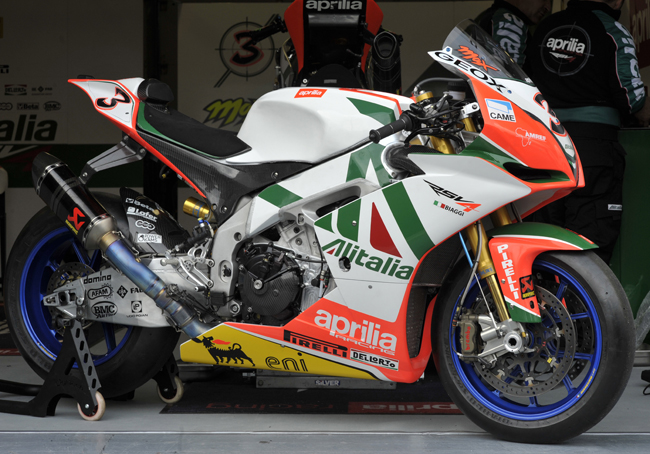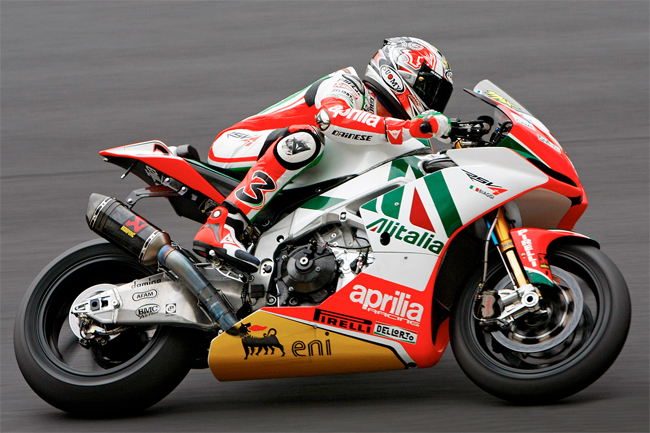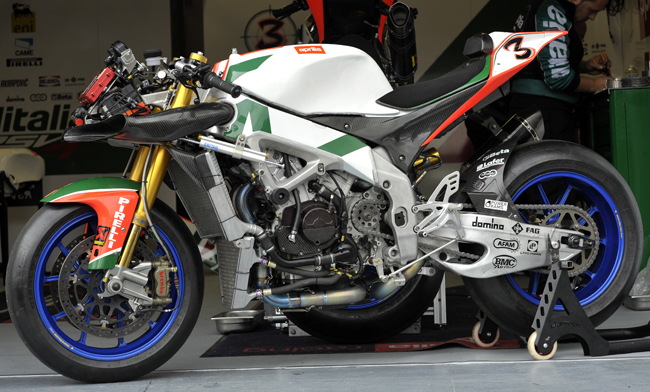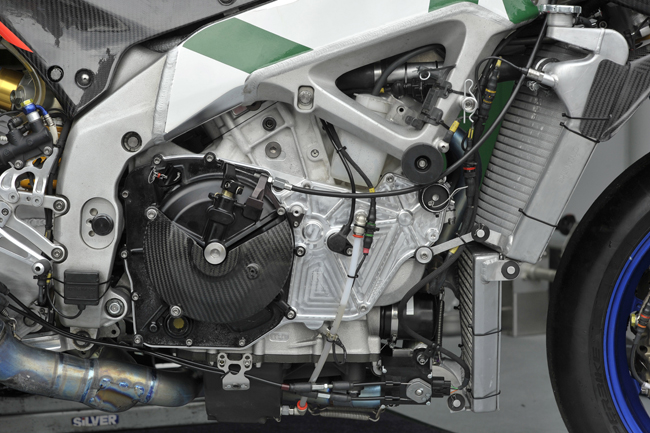MotoOnline.com.au goes behind the scenes with Max Biaggi and the Alitalia Aprilia team.
Sometimes in motorcycle racing there are statistics that take you by surprise. Little pieces of knowledge that you never would have guessed, but seem so obvious once highlighted.
In World Superbike racing, the fact that Max Biaggi and Aprilia’s 2010 championship victory is a first for an Italian rider in WSBK and the first for the Noale-basd manufacturer, this title ranks as one of the most famous in history.
Things haven’t come easy for four-time 250cc Grand Prix World Champion Biaggi in WSBK, nor have they for successful GP manufacturer Aprilia despite having considerable race success in the past.
A return to Superbike with the beautiful RSV4 in 2009 and enlisting the services of Biaggi for the season proved genius, the pairing dominating the series in season 2010 in a year that, on paper, was supposed to be one of the closest ever.
Biaggi and the Aprilia Alitalia Racing Team captured no less than 10 wins in 26 races, as well as four other podiums, two Superpoles and a pair of fastest race laps to cap off a memorable season.
The 39-year-old Roman Emperor’s form during this season has been impeccable, building momentum from the team’s debut year in 2009 and improving massively in a surprise championship year for the team.
Biaggi eventually wrapped up the title at the penultimate round of the season in Italy at the historic Imola circuit in September, a dream place to seal the crown despite finishing with just 11-5 results after a disastrous and inconsistent home round.
“This is a grand day,” Biaggi beamed after winning the title. “[It’s] a day which I have greatly desired. I’ve often felt in past years like I hadn’t been placed in the proper conditions to be able to express my worth and to achieve the results that I know I deserve.
“This is one of the reasons that, at a certain point in my career, I chose this world – the SBK championship – and this is why I wanted to surround myself with the right people for this adventure, because racing isn’t just about speed, tyres and an engine.
“It is also about joy and having fun and with these guys, with this team, I feel at home. It has not been an easy season. Many riders have won races and if they had been just a bit more consistent, they would have been able to be more troublesome for us.
“The greatest moments were the double victories at Monza and Misano. It is something very special to win in front of my fans.”

Max Biaggi won the 2010 Superbike World Championship for Aprilia on its immaculate RSV4.
It was clear from his erratic riding at Imola, particularly in race one, that he was feeling the massive pressure of expectation to not only win the title, but win it this weekend, in Imola, for Italy. And he knew it was a terrible track to ride his Aprilia around.
“I did not think it was possible to win here because our bike is very complicated to get working over the bumps,” said Max. “In race one we didn’t have the package to stop over the bumps and accelerate hard out of the corners. I went straight through the gravel twice and the first time I really nearly crashed.
“To race in this condition knowing that I couldn’t lose too many points is mentally very tough. Unbelievably stressful! Experience always makes the difference and for race two I made a change that I had never tested before. We changed the offset and that gave me a better feeling on the brakes going into the corner. I just knew it would be an improvement and it was.”
Biaggi was bullish about his part in the success of the Aprilia operation. He has developed the RSV4 with the assistance of teammates and Aprilia test rider Alex Hofmann, however it’s namely Biaggi who steers Aprilia’s development ship.
“I made an incredible job with this machine,” he boasted. “In 2009 we had no data, no gearbox settings. Whoever rides this bike in the future has to say 1000 thanks because I made the dirty job! I gave everything to develop this bike and I have sweated a lot.”
It’s clear that the title means a lot to Biaggi, even coming somewhat unexpected for him, and it’s a victory that will remain a historic one for the Italian-run WSBK series.
Roberto Colaninno, chairman and CEO of the Piaggio Group, is also proud of the achievement after a highly successful season of competition – something that is likely to strengthen Aprilia’s production sales.
“Today we achieved an extraordinary result which takes place in the second year of Aprilia’s participation in World Superbike and, once again, confirms the technical excellence of the Noale Racing Division as well as the Piaggio Group in the two-wheel worldwide scene,” Colaninno commented in Imola.
“It would be impossible to imagine anything better on a day like today. We won the World Superbike Championship on an Italian track, with an Italian bike, an Italian rider and a sponsor – Alitalia – which takes Italy all over the world. This has never before happened in Superbike history and this makes all of us that much more proud.”
With Biaggi winning his first ever world championship in 250GP with Aprilia back in 1997, the collaboration to capture the WSBK crown almost 15 years later is the perfect reward for the reunion of the pairing.

Biaggi was the dominant man in 2010 for Aprilia, adding a fifth world title to his illustrious career.
Not only was Biaggi reunited with the manufacturer, but also with Aprilia Alitalia team manager Francesco Guidotti. The brother of Giacomo Guidotti, technical director for Suzuki Alstare, Francesco returned to Aprilia to run the WSBK team in 2010 after working for KTM in GP racing during the past four seasons.
Guidotti worked for Aprilia back in 1993 and in 2001 and 2002 was team manager for the Aprilia WSBK effort. Guidotti then switched to the Aprilia MotoGP project in the 2003 and 2004 seasons before running the last factory Aprilia team to take part in the 250 class in 2005. Since then, he had been with KTM until this season.
“This year has been really fantastic because we achieved a goal that we planned in three years, so we are one year in advance,” the intelligent Italian said. “It’s a big, big result because this is not only the rider championship, but also the manufacturer championship – it’s a great, great result with a bike so young.
“It’s been a perfect condition, everybody had their own chance to fight and there are no excuses. The championship has been perfect from every point of view – the weather, no injuries and many good riders. It’s a real title, so we are really proud for Italy since we are Italian, have an Italian rider and Italian sponsors.”
Guidotti is the first to praise Biaggi’s exceptional set-up skills for the development of the RSV4, crediting his GP experience in both the tiddler classes as well as the premier class – namely is MotoGP experience.
“It’s a special package, an Italian package,” Guidoti said of their working relationship. “Max makes it easier because he has made a great job in accelerating development with his instructions and opinions. The last 250 championship with him was great, so to be back here again with him in a completely new project is great.
“He’s a champion. Not one time champion, but five times champion. Not only is he fast, but he has a sensibility to know what he needs to go fast. For sure, his experience helps in the development, especially his four-stroke MotoGP experience with the electronics.”
And while winning is the ultimate goal for all in the Superbike paddock, converting that on-track success to sales on the showroom floor is what will make the project worthwhile for Aprilia in its return to building 1000cc production superbikes.
“Hopefully this championship will help sell more bikes,” Guidotti enthused. “In 2000 we were very close to win the title with Troy Corser, but we never achieved this goal. So we did it now, but the market condition in general is very difficult. Hopefully it will help. It’s the most beautiful bike on the market, but we will see what the result of this championship will bring us.”
Combined with the production variation’s first class quality and highly inviting looks, this championship is just what Aprilia needed to confirm its status as one of the best in the business when it comes to producing all-round superbike contenders.

In just its second season of WSBK competition, the RSV4 is the benchmark in the series. Many compare it to MotoGP machines, but it's a complete production model.
The Benchmark – Aprilia’s RSV4 WSBK Contender
Aprilia’s RSV4 Superbike contender has blurred the lines between production-based WSBK racer and full-on MotoGP prototype. In short, the RSV4 has been built with one goal in mind – to win in World Superbike.
It may have only taken two seasons, one for development and another to get the job done, but Aprilia’s rapid rise to the top has been a result of hard work and great determination by a relatively small project team.
Aprilia fielded eventual champion Biaggi and young British talent Leon Camier during 2010, the pair working together well in an intense combination of experience and enthusiasm that rookie BSB champion Camier brings to the team.
Surprisingly, Aprilia crew chief Lele Martinelli says that the RSV4 race bike features a completely standard frame, although it does have a factory swingarm.
The team utilises Ohlins suspension, with Biaggi adopting ‘through-rod’ forks for 2010, a fork that favours turn-in, albeit lacking in hard braking areas. Once Biaggi used the fork in testing, he has run it all season despite many opponents opting for more conventional gas charged forks.
Although Biaggi’s outright performance is stronger with the through-rod fork, the window of a good setting is said to be significantly harder to find. Unlike most teams, Aprilia develops and handles its entire suspension development in-house.
A solid base set-up has helped the team improve consistency during this season, and Martinelli explained that the team retains the same geometry at 90 percent of the circuits on the calendar.
For season 2011, the team is still very much aware that turning needs to be improved – especially in the tighter sections –, however it’s believed this improvement will come via a smoother engine acceleration curve.
Engine-wise, the RSV4 race bike has a factory kit including a larger radiator and improved venting, but it does feature a standard fuel pump and injection system.
The engine has proven faster this season with more power all-round, but Biaggi still requests a smoother powerband that will make the bike more user friendly over a race distance.

The four-cyclinder RSV4 engine has been at the centre of attention in 2010 with its gear-driven camshafts. They're banned for 2011.
Aprilia has used gear-driven camshafts for much of this season, although they have been outlawed for 2011. They’re required to return to chain-driven camshafts for next season unless their production bikes are released standard with gear-driven cams.
Aprilia and Biaggi have dominated the series this season, however only adopting the technology mid-season, and the Italian manufacturer seems cheated in some ways that the engine has been outlawed. Despite the fact, Biaggi won at Magny-Cours’ finale without the gear-driven system.
Electronics are vital in WSBK racing in the current era, almost at the level of MotoGP, which is something that test rider Alex Hofmann continuously develops with a focussed test team. Likewise, the entire racing project is connected to the production team to ensure the development crosses over.
Traction control is the most highly developed electronic function on the RSV4, but electronics to assist with engine braking while downshifting, plus launch control are also important pieces to the WSBK puzzle. The hardware and software is again all developed by Aprilia in-house.
TC can be adjusted throughout the race, while the engine braking electronic system uses just two settings that can be adapted mid-race – both operated via an assortment of coloured buttons on the left handlebar.
Interestingly, despite his GP experience, Biaggi refuses to take advantage of the launch control.
Another interesting aspect of the RSV4 WSBK contender is that it uses a standard dash that’s identical to the street bike, according to Martinelli.
Other components featured on Biaggi and Camier’s bikes include Brembo brakes, Afam sprockets, Regina chains, BMC airfilters and Akrapovic exhaust systems.
While 2010 has been a breakthrough year for Aprilia in WSBK, it looks like next season will be just as successful for the Italian manufacturer after Biaggi managed to win on debut at Magny-Cours’ season finale using a very early version of the 2011 model race bike.
Add in the fact that Camier will return and Nori Haga will be on a factory-supported satellite RSV4 and next season will be another one to remember for the Italians.







Newsletter